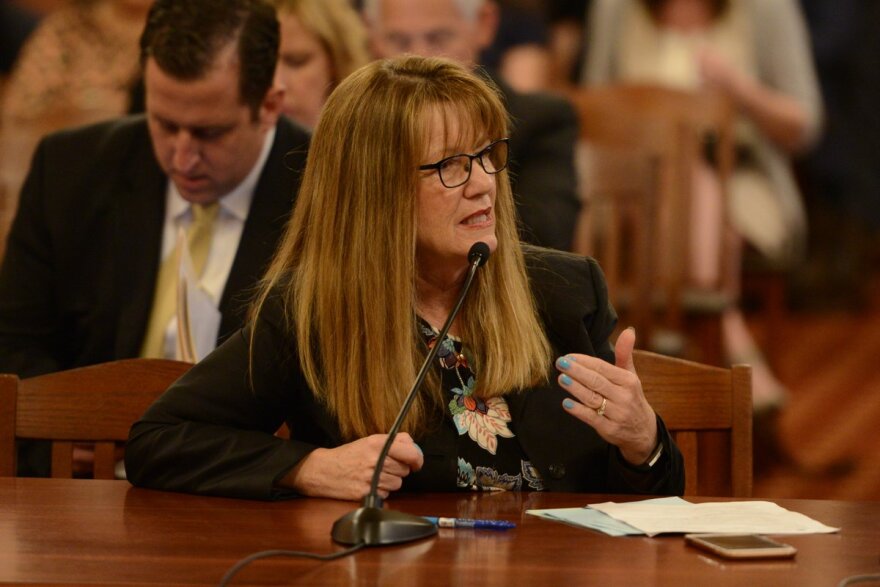In addition to an overhaul of how the Illinois General Assembly deals with sexual harassment among its ranks, lawmakers approved several other measures meant to address concerns from the #MeToo movement.
This comes after a tumultuous session in which two legislators and an aide to House Speaker Michael Madigan were accused of misconduct.
State Sen. Melinda Bush, D-Grayslake, co-chairs the Senate Task Force on Sexual Discrimination and Harassment Awareness and Prevention and says there is more to come.
“With the whole Me-Too movement, women and certainly men, but women more so, are stepping up and saying this happened to me, it's not okay and something needs to be done about it,” said Bush. “So we're going to continue to work to change as many laws as we can. We take this work very seriously.”
Below is a round up of bills headed to the governor’s desk that answer concerns from the #MeToo movement.
Ethics Commission Overhaul
HB 138 - Last week the Illinois General Assembly passed a measure that would overhaul the power of legislative inspector general and the Legislative Ethics Commission, which investigates, among other things, cases of harassment or misconduct by lawmakers and their staff. Now, hiring power of the inspector general comes from the four party leaders. If Gov. Bruce Rauner signs the bill a search committee will recommend candidates to the Ethics Commission, who will then send applicants up for a vote from the General Assembly.
Sen. Tim Bivins voted for the bill, but expressed concerns about legislators sitting on the Ethics Commission. Bush, who sponsored the bill, said his concerns are valid, but this is merely a first step that had to be taken before session’s close.
Members of the task force expect to file several more bills on sexual harassment discrimination before their final report is published in December.
Survivor’s Bill of Rights
SB 3404 - Sen. Kwame Raoul, D-Chicago, sponsored the Survivor’s Bill of Rights, which fills gaps in Illinois law to match federal guidelines. Should Rauner sign the bill, survivors of sexual assault would have the right to a copy of their police report. The bill would also provide a longer statute of limitations for rape kits to be tested and prevent law enforcement from filing charges against the survivor for the presence of alcohol or drugs as a result of the hospital exam.
The measure also allows for additional comfort to the victim, providing assault survivors with the right to shower at the hospital following their exam and the ability to have an advocate present for all parts of the examination.
Publishing Severance Agreements
HB 4242 - This measure would require taxing bodies to publish severance agreements they enter with employees found guilty of sexual assault or discrimination. This information would need to be made public within 72 hours of entering into the agreement and include the name of the guilty party, the amount of the payment and an explanation of what the employee was found guilty of.
Bill sponsor Rep. David McSweeney, R-Barrington Hills, said publicizing this information should discourage the use of severance agreements.
No Taxpayer Dollars Used In Sexual Harassment Payouts
HB 4243 - Another bill from Rep. McSweeney would prevent taxpayer dollars from being used in exchange for silence of a victim of sexual harassment by an elected official. Rather than appropriating these funds from Illinois tax dollars, the measure would require all payouts be funded from the guilty member’s office.
Though McSweeney had not heard of any instance of this happening in Illinois, he said this legislation would prevent it while also holding individuals in office accountable for their actions.
Increasing Sexual Assault Trained Nurses
HB 5245 - Aimed at how survivors of sexual assault are treated across the state, this measure would require hospitals to increase the number of sexual assault nurse examiners (SANEs) by 2022. Specially trained nurses would have the proper experience to complete a rape kit thoroughly and accurately without added undue stress to the victim.
The measure was widely supported, however the Illinois Health and Hospitals Association expressed concerns with meeting the four-year deadline. The measure would require an additional 650 nurses to undergo the 40-hour training and clinical experience. The increase in nurses capable of completing the kits could also add to the state’s already existent backlog of rape kits needing testing.
Restructuring the Human Rights Commission
SB 20 - After the legislative inspector general position was found to have gone vacant for three years, the state hired interim Legislative Inspector General Julie Porter and began work tackling the backlog of misconduct claims.
Sen. Heather Steans, D-Chicago, proposed this measure set to expedite the process of addressing these claims. The measure changes the Human Rights Commission from 13 part-time commissioners to seven full-time and implements a temporary three-person panel to address the backlog.
Requiring Sexual Harassment Policies
SB 405 - The measure would require all companies that do business with the State of Illinois to have a sexual harassment policy in place. Companies that also claim EDGE tax credits must send an annual sexual harassment report to the state.
SR 1561 - Also passed on the last day of session was a resolution urging the Equal Employment Opportunity Commission, the Illinois Department of Human Rights and the Illinois Department of Labor to investigate the apparent culture of harassment existing at Chicago’s two Ford Motor Company plants and provide support to victims. Employees of both locations provided testimonies on the existence of such a culture to the Senate Task Force in March.
This story will be updated with action from the governor.






